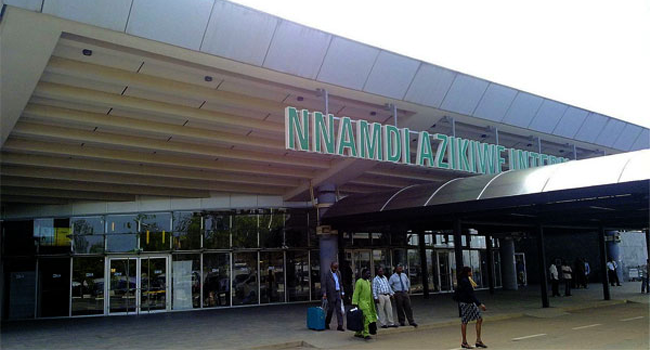The Federal Government of Nigeria allocated N8.73 billion for airport power infrastructure in 2024, primarily aimed at ensuring a stable electricity supply at the new international terminal of the Nnamdi Azikiwe International Airport in Abuja.
This expenditure was revealed in a report from BudgIT’s transparency platform, GovSpend, which was accessed by The Telegraph on Wednesday.
According to the report, significant payments were made to J. Marine Logistics Ltd for outsourced power supply. These included N5.67 billion for services between March and September 2023, N2.19 billion on May 9, 2024, for power covering October to November 2023 and part of December 2023, and an additional N874.42 million on the same day as part-payment for power during that period.
The Nnamdi Azikiwe International Airport has long struggled with erratic power supply, leading to operational disruptions and passenger dissatisfaction. Power outages have often impacted critical services, including airfield lighting, baggage handling systems, and security scanning equipment. These disruptions raised safety concerns, especially during night operations and peak travel periods.
Reacting to the development, aviation expert Olumide Odunayo lauded the government’s efforts to address these challenges but emphasized the need for a more sustainable solution.
“The airport should invest in an alternative power source, such as a solar or wind system,” he suggested.
Odunayo also noted the high costs associated with the current power arrangements, which rely on the national electricity grid and diesel-powered generators.
“The current supply from the grid is extremely expensive, affecting not just the airport but also the businesses operating within it. This escalates the cost of services, which is ultimately passed on to passengers,” he explained.
He further criticized the inefficiencies of diesel-powered generators: “Power failures lead to a reliance on diesel-guzzling generators, which are both costly and unsustainable. Airports should invest in independent power sources or explore renewable alternatives.”
Odunayo called for a shift to renewable energy sources like solar and wind power, arguing that they would reduce long-term costs and offer a more reliable and environmentally friendly energy supply.
“It would be far better to focus on cost-efficient and environmentally friendly alternatives. This would ensure both reliability and significant savings in the long run,” he said.
In addition to the 2024 expenditure, the Federal Government has earmarked N105.95 billion for the aviation sector in the 2025 budget, a significant increase from the N63.32 billion allocated in the previous year.
Among the proposed allocations, N5 billion is designated for power and energy improvements at airports in Lagos, Abuja, and other locations. This project is described as “ongoing.” Another N5 billion is set aside for the development of aerospace facilities in Abuja, also deemed “ongoing.”
These investments are part of broader efforts to improve passenger experiences, enhance operational efficiency, and position Nigeria’s airports as key international hubs. The new terminal at Abuja airport, inaugurated in December 2018, was designed to accommodate growing passenger traffic and offer state-of-the-art facilities.
In May 2024, Minister of Aviation and Aerospace Development, Festus Keyamo, revealed that the Federal Government spends approximately N1 billion monthly on electricity at Lagos airport. He added that the ministry is working toward adopting more eco-friendly practices, including reducing reliance on diesel in airport operations.
“We are gradually transitioning to solar power systems, which will significantly cut operational costs, saving the government 30% of current monthly electricity expenditures,” Keyamo explained.
He also noted, “We are making cautious but steady progress towards eco-friendly practices, in line with the global push for green technologies and the International Civil Aviation Organization’s (ICAO) long-term goal of achieving net-zero carbon emissions in the aviation sector.”
Keyamo further emphasized the ministry’s commitment to reducing carbon emissions by phasing out diesel-powered operations. “We aim to run airports on solar power, which will provide substantial savings each month. For example, Lagos airport alone spends N1 billion monthly on electricity, and this is something we are working to reduce,” he said.


